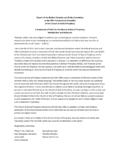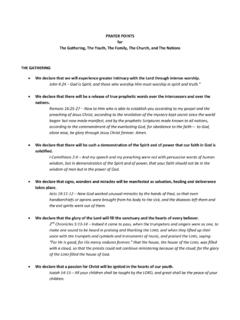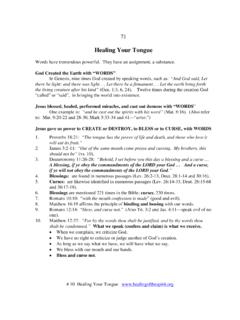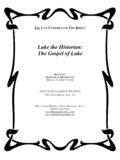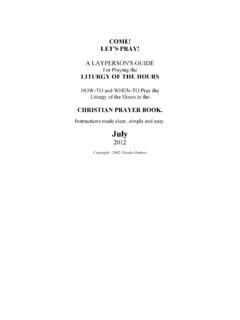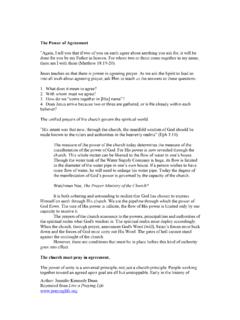Transcription of Theology 2.11– Word made flesh - Authentic Discipleship
1 Theology Word made flesh Page 1 A. VIEWS on ATONEMENT: 1. General: a. Most systematic theological approaches teach positions supported by proof texts. Proof texts essentially are verses pulled out of context from Scripture to validate a particular position. The problem with this is that it does not yield an overall-organic or holistic understanding of Scripture. b. Theology is not something you get out of a book. For Theology to be real you need to grapple with the issues on your own before God through the auspices of the Spirit. The text informs the mind, love of God softens the heart. The guidance of the Spirit brings immediacy and clarity. Theology develops as you experience God s grace and redemptive influences playing out in your life.
2 Theology develops as you see things that don t make sense to you and you cry out and bring these things to God expecting Him to help you make sense out of them. c. There are different approaches to Theology : i. Historical Theology deals with theological issues as they have changed throughout the history of the church. Ideas and ideals of what is true will change somewhat over time based on cultural and epistemological-ecclesiastical changes. You can look back and see how prominent theologians have revised normative theological thought through history. ii. Biblical Theology deals with Theology based on what the Bible says holistically through exegesis and hermeneutics. This is often considered the best approach as it relies on the text to frame and develop theological thought.
3 Iii. Systematic Theology deals with specific issues and pulls from a variety of sources, but leans most heavily on proof texts. Systematic Theology deals with theological themes one by one rather than employing an organic unified view. iv. Apologetic Theology deals with how a theologian would make their point to a non-believer. The Apostle Paul was a master of this form as he drew from the historical-cultural context of the people to whom he was speaking explaining his point in terms they could grasp. The point is to draw from word concepts already understood by your audience. v. Practical and personal Theology recognizes that God develops each person s Theology out of their world and life experiences. Such that each person will have a somewhat different perspective.
4 Vi. Integrative Theology seeks to unify all of these approaches to provide a greater view of the issues. Theology Word made flesh Page 2 d. Most people take years and years to work out their own and do so alone without the benefit of a mentor to guide their process. This is unwise. It is always helpful to have a mentor you trust who has walked with God a long time to provide you with counsel and alternative ways of thought. In the end, each person is responsible for their own thinking and their own actions before God. e. Just knowing facts or various approaches without personally fighting through the issues is not particularly useful, and certainly not transformational. Once you have fought through issues prayerfully and diligently through Scripture with the guidance of the Spirit and more mature mentors does it really become your own.
5 2. Pre-Cross verses post-Cross a. Jesus teachings stayed in the context of His mission to the Jews until their rejection of Him and His crucifixion. When the Jews rejected their King and Messiah, the way was opened for direct access to all peoples. This was always God s plan, but it had to unfold in history. b. Jesus fulfilled the Law up through the Cross then everything for the better! After the cross atonement was made for all of humanity, not just the nation of Israel. After Pentecost the Spirit was made available to all who in faith believing received Jesus as Savior and Lord. c. Thematic changes of Pre-Cross versus Post-Cross: i. Inclusion of Gentiles as Equal Citizens of the Kingdom of God: 1. OT Numbers 15 states there was only 1 Law for both the natural born Jew and the God-Fearing Gentile; there was no distinction made between them.
6 2. The truth was that OT and NT era Gentiles were definitely not equal with the Jews; they were included only on Israel s terms. 3. After the Cross this was no longer the Jew and Gentile were on even standing before God, this is a huge change! ii. Sacrificial System: 1. Was the norm for atonement and sin up until the Cross. God had decreed that the only remedy for forgiveness of sin was through Temple sacrifice. However, only Jews could enter the holy place of the Temple, Gentiles were relegated to an outsider position. 2. Jewish belief was based on faith AND your actions validated your faith. True faith needed both good works and belief. 3. After the Cross it was justification by faith although it is expected that personal change will accompany true faith, it is no longer a requirement.
7 This is a huge change! OT Tithing was based on paying tribute to an it was a required or compelled system. OT love Theology Word made flesh Page 3 offerings are based on pleasing God and deliberately aligning oneself with His purpose and interests. It is no longer a matter of compulsion. iii. Response to God: 1. John 4:21-23 The generally accepted idea of what God was looking for from His worshipers was faith and works. Temple worship was the norm, synagogue study was the norm. 2. Was the change dramatic or subtle? 3. God s plan was always the same but the proclamation changes over time. This is how Theology plays out Diachronically throughout redemptive history. It is still faith at work in us and through us, but our approach to God has changed we now have the Spirit indwelling us and have no need of a Temple to as our own hearts is now the Temple in which God resides and communicates with humanity.
8 4. NT revelation shows that both Jesus and the disciples teaching do change after the Cross: a. Focus is on the person s intent, not on their action alone. b. Faith is always more valuable than works. c. Role of the Spirit versus the Law the Law was a custodian until Messiah came and the Spirit set free. d. Jesus cleansing of the Temple set the stage for the cleansing of the human heart. Interestingly, the place they had set up for selling was the Temple court reserved for the their practice prevented the righteous faithful non-Jews from coming to worship God. e. God s abode on earth is the temple of a human heart, not the temple in Jerusalem. f. Biblical values of morality and ethics remain consistent the ideals remain the same, but the means change over time.
9 In the NT we have the indwelling Spirit to engage Spiritual transformation and sanctification where God enables us to live lives that are pleasing to Him. The OT Law provided no power for such personal change. g. Cross & resurrection teachings are subtle before the Psalms (especially Psalm 22) and prophecy such as Isaiah s Songs of the suffering servant provide OT insights into the necessity of the cross. In the NT much is inferred and hinted at in the Gospels, but afterward in the Epistles it is clearly stated Jesus is God in the flesh . He is the perfect atonement reuniting God Theology Word made flesh Page 4 and humanity in His own He did what none other could do and as a consequence He is to be worshipped and and doing so glorifies the father .
10 It is not accidental that the majority of the earliest Christians were then it radiated outward. The Jews understood the redemptive gift Jesus offered and the freedom that was provided in the Spirit. 5. Getting right with God completely changes with the Cross: a. Jesus is the only Name by which one is saved. b. Holy Spirit indwelling now leads believers into caretaker role of the Law is ended, God Himself now perfects us [Phil 1:6]. c. Joel 2 Law is now written on human hearts, and the Spirit is poured out onto humanity. iv. Emphasis of the cross changes in Acts: 1. Joel 2 is supported in Acts 2:17-21. 2. Jesus is Lord and Christ 2:36. 3. Peter s leadership proclamation demonstrates a fundamental change that had occurred in him something done by the Spirit not through his own strength or wisdom.

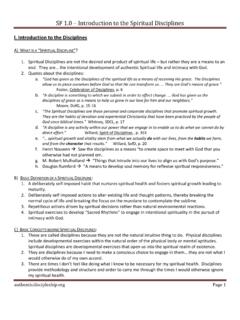

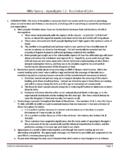
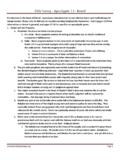

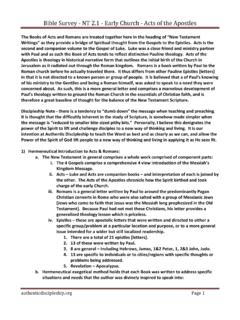


![Theology 3.1 Theology of the Church [Ecclesiology]](/cache/preview/a/f/9/c/b/8/4/1/thumb-af9cb8416ff3f661442ece1bfd5dced1.jpg)
